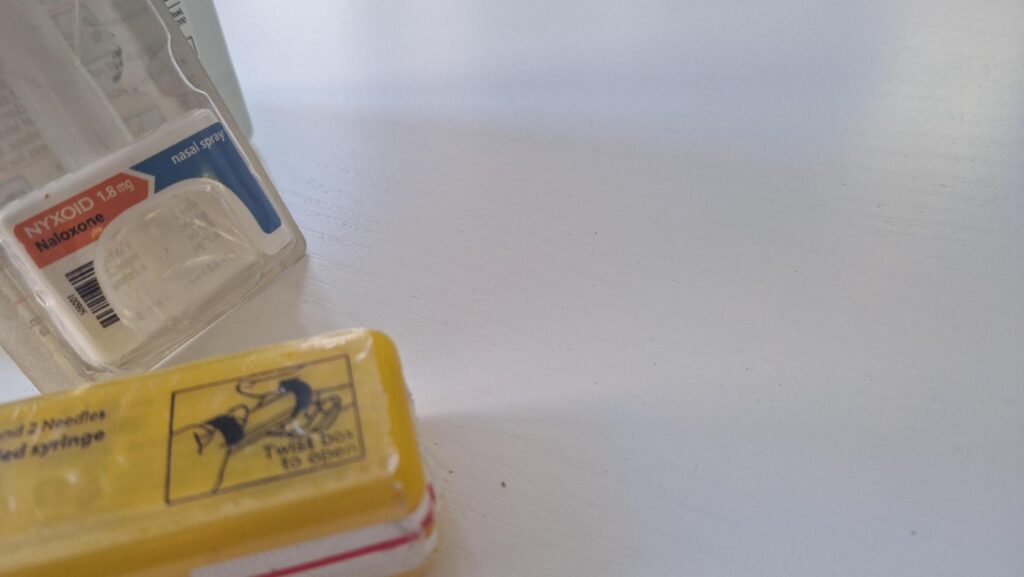This is the highest figure on record, for a 12th consecutive year.
47% of those deaths involved opiates, while 195 deaths involved a nitazene.
This is four time higher than 2023.
However, there is hope. Across the world, Naloxone nasal spray and injections are reversing the effects of opioid overdoses and saving lives.

Naloxone is an emergency medication that can reverse the effects of an opiate or opioid overdose from substances like heroin, methadone, or morphine.
Importantly, naloxone also reverses the effects of potent synthetic opioids like nitazenes and fentanyl, which are becoming more common in the UK.
Many people across the UK carry it in case of emergencies. The effects of naloxone don’t last very long. It is vital to always call 999 and ask for emergency help when you use it.
All The Wallich’s operational support staff are trained in administering naloxone, both via injection and nasal spray.
We stock naloxone in all our services and encourage our staff to carry naloxone, both inside and outside of work.
Our aim is to keep our service users safe, no matter what they’re going through or where they are in their personal journey.
“I once had to break down a bathroom door to reach a resident who had overdosed after using heroin. It was an incredibly tense and frightening moment, but I was able to act quickly and administer naloxone.
“Within moments, the resident began to regain consciousness – it genuinely saved their life. That experience really brought home how vital it is that frontline workers have access to naloxone and the confidence to use it.
“I’m so thankful it was available to me that day; without it, the outcome could have been very different.”
“When I first started working at The Wallich on nights, a service user collapsed in the kitchen. I’d only been in post a couple of months and wasn’t experienced in the sector. I’d done naloxone training but never used it before.
“This was before nasal naloxone was so common, injecting someone was intense but he was more conscious by the time the ambulance arrived, and I was surprised about how easy it was to use.”
“Without naloxone, we could have lost so many residents. Sadly, due to the trauma our clients have experienced, life is a struggle and they often do not believe they are worthy to be alive.
“Escaping through drugs and alcohol is hard for them to avoid and unfortunately easy to overdose on. Naloxone is a life-saver.
“I am so grateful that The Wallich allows staff to use naloxone and provides excellent training so that staff feel confident in using it.”
“Having naloxone available in the workplace can mean the difference between life and death. It is a simple and effective way to protect both employees and residents”.
At The Wallich, we believe in harm reduction and want to create safe spaces for our service users and staff.
We provide sharps bins in our services and can support with access to clean and appropriate equipment, and safer injecting advice.
We believe that we must support people as they are, not as we wish they would be.
All staff are encouraged to have a trauma-informed, honest and trusting relationship about drugs.
We think it is one of the best ways we have of reducing harm and keeping them safe.
Staff at The Wallich give the following advice to people who use drugs. This advice has been proven to save lives.
The Wallich advocates for drug-related policy to take a health approach, not position it as a criminal offence. That’s we we’ve been calling, for many years, for an Overdose Prevention Centre in Wales.
These approaches save lives.
Barod, is an agency that provides high quality substance use services, including detox, one-to-one support, needle exchange, training, and young people’s services.
One of Barod’s services is a naloxone click and deliver service.
The Naloxone click and deliver service is a free service which offers a kit of naloxone, delivered to your house or workplace, along with a variety of harm reduction related resources.
Barod also provide overdose awareness and naloxone training.
This service is beneficial for anyone that lives or works in a community where opioid drugs are frequently used and the risk of an overdose is high.